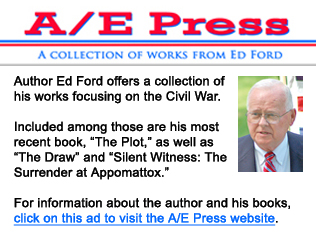|
View from both sides…
It really wasn’t a ‘Civil War,’ spokesman
for SCV’s Confederate Library maintains
It’s a misnomer to call America’s pivotal internal conflict the “Civil War,” according to a spokesman for the Florence (Ariz.) Confederate Library.
“I try to explain to youngsters and other people that civil wars are fought by two factions trying to take over a country,” Bookard Dooley maintains. “This was a war of secession and revolution in which the South wanted to leave the United States.”
Calling it the “war between the states” isn’t quite right either, Dooley continued.
“The war wasn’t between the states; it was between two entities, two governments.”
The Southern states wanted to peacefully secede; slavery was an issue, but not the whole story, Dooley said. The North had the population and could have voted at any time to end slavery, but was enjoying wealth from the slave trade, he commented.
“The North was using the power of the vote to infringe upon the weaker states, which caused the Civil War. Lincoln himself said he would free the slaves or not, whatever it would take to save the Union. It was economics; the South was leaving because it was being unfairly taxed.
“The Emancipation Proclamation only freed the slaves in the Southern states, not in the seven Northern slave states. They kept their slaves and continued an organized slave trade,” Dooley said. “After the war ended and the 13th Amendment freed the last of the American slaves, Northern interests continued the illegal trading in slaves with other countries until 1885.”
While the Civil War is the centerpiece, it’s not the whole story of the Confederate Library, sponsored by the Sons of Confederate Veterans (SCV). There’s also a framed poster of former Iraqi dictator Saddam Hussein working in a field with some farmers, apparently for a photo-op. There’s a room off the main library where small groups of visitors can watch war documentaries, including a series on the Korean War.
Dooley also is displaying the extensive reports he has compiled on the soldiers from his battalion in Vietnam who were killed in action, including a battle in which only he and two other members of his platoon survived.
“I have casualty dates … I have after-action reports of battles. These were the men that died that day. I have a picture of them, descriptions, stories about them.
“I’ve seen a lot of good men die before my eyes. … I’m putting flesh on them, a soul. … When you open this up, you’re going to see what the mother, the wife, the sister, said about them, a memorial. And there are some really sad stories. Some former soldiers get choked up when they see it; others say, ‘This is what we need.’
“The value of studying American wars is so that we understand our past, our present and maybe prepare us for the future,” Dooley said. “Our children are very historically ignorant in a lot of ways and we’re not teaching history the way it should be taught. We’re not teaching both sides of it.
“I mean, Hitler was a monster, he was mean and nasty, but you have to understand the mind-set. By studying their politics, you’ll understand our enemies. You’ll understand who we are. You’ve got to be strong, you’ve got to have morals, and you’ve got to be ready to fight for your country at a moment’s call. …
“I fought under that American flag in two wars. My father fought under that flag in World War II. We all need to respect it; not disrespect it, and learn from it. And learn how you’re going to serve this country to make it even greater than it is.”
In addition to 450 books and magazines, there’s plenty to see in the Confederate Library. There are photos, bullets, a bayonet and other artifacts, including a “hospital bullet” covered with teeth marks.
Most of the artwork is Civil War-era, including a display of documents that belonged to Francis Dooley, the Confederate great-grandfather of Bookard.
|



